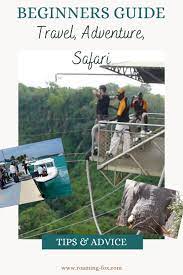Embarking on adventure travel is an exhilarating journey that promises unique experiences and challenges. Whether you’re a thrill-seeker looking to summit mountains, explore remote landscapes, or engage in adrenaline-pumping activities, being well-prepared is essential for a successful adventure. Here are some tips for beginners in adventure travel:

1. **Research Your Destination:**
– Before venturing into adventure travel, thoroughly research your chosen destination. Understand the terrain, climate, local customs, and any potential risks associated with the area.
– Familiarize yourself with the local regulations and permits required for specific activities, such as trekking, climbing, or water sports.
2. **Start with Beginner-Friendly Activities:**
– If you’re new to adventure travel, begin with activities suitable for beginners. Hiking, kayaking, and introductory rock climbing are excellent options to build your skills and confidence.
– Join guided tours or hire experienced instructors to ensure a safe and enjoyable introduction to adventure activities.
3. **Invest in Proper Gear:**
– Quality gear is crucial for safety and comfort during adventure travel. Invest in appropriate clothing, footwear, and equipment tailored to the activities you’ll be engaging in.
– Seek advice from experienced adventurers or outdoor retailers to ensure you have the right gear for the conditions you’ll encounter.
4. **Physical Preparation:**
– Assess your fitness level and engage in a fitness routine that aligns with the demands of your chosen adventure. Build endurance, strength, and flexibility to enhance your overall performance and reduce the risk of injuries.
– Consider consulting with a fitness professional or adventure travel guide to create a tailored workout plan.
5. **Learn Basic Outdoor Skills:**
– Acquire essential outdoor skills such as navigation, map reading, and basic first aid. Knowing how to use a compass, read topographic maps, and administer first aid can be invaluable in remote locations.
– Take outdoor courses or workshops to enhance your skills, and practice them in controlled environments before embarking on more challenging adventures.
6. **Travel with a Partner or Group:**
– For beginners, traveling with a partner or joining a group expedition adds a layer of safety and support. You can share responsibilities, learn from others, and have assistance in case of emergencies.
– Choose companions with similar skill levels and goals, and communicate openly about expectations and capabilities.
7. **Understand and Respect Nature:**
– Adventure travel often takes place in natural environments. Understand and respect the ecosystems, wildlife, and local flora. Follow Leave No Trace principles to minimize your impact on the environment.
– Be aware of weather patterns and how they can affect your activities. Stay informed about potential hazards such as avalanches, river currents, or extreme temperatures.
8. **Embrace a Mindset of Continuous Learning:**
– Adventure travel is a continuous learning experience. Embrace the mindset of a student, seeking knowledge from experienced guides, fellow travelers, and outdoor experts.
– Learn from both successes and challenges, and be open to adapting your approach based on the lessons gained from each adventure.
9. **Pack Wisely:**
– Pack efficiently by focusing on essentials. Consider factors such as weight, versatility, and durability when selecting gear and clothing.
– Carry sufficient food, water, and emergency supplies. Check and double-check your packing list to ensure you have everything you need for the duration of your adventure.
10. **Prioritize Safety:**
– Safety should be your top priority in adventure travel. Follow safety guidelines, use proper equipment, and adhere to recommended practices for each activity.
– Stay informed about emergency procedures, carry communication devices, and inform someone reliable about your itinerary and expected return.
11. **Be Mindful of Cultural Sensitivity:**
– Respect local cultures and customs. Research and understand the traditions of the communities you encounter during your adventure.
– Learn basic phrases in the local language, and be aware of cultural norms to ensure positive interactions with locals.
12. **Stay Flexible and Adapt:**
– Adventure travel often comes with unexpected challenges. Be flexible and open to adapting your plans based on changing conditions, unforeseen circumstances, or new opportunities.
– Cultivate problem-solving skills and maintain a positive attitude, as adaptability is a key trait in the world of adventure travel.
Embarking on adventure travel as a beginner is a thrilling and rewarding experience. By combining preparation, education, and a willingness to embrace challenges, you can embark on unforgettable adventures while ensuring your safety and well-being.






